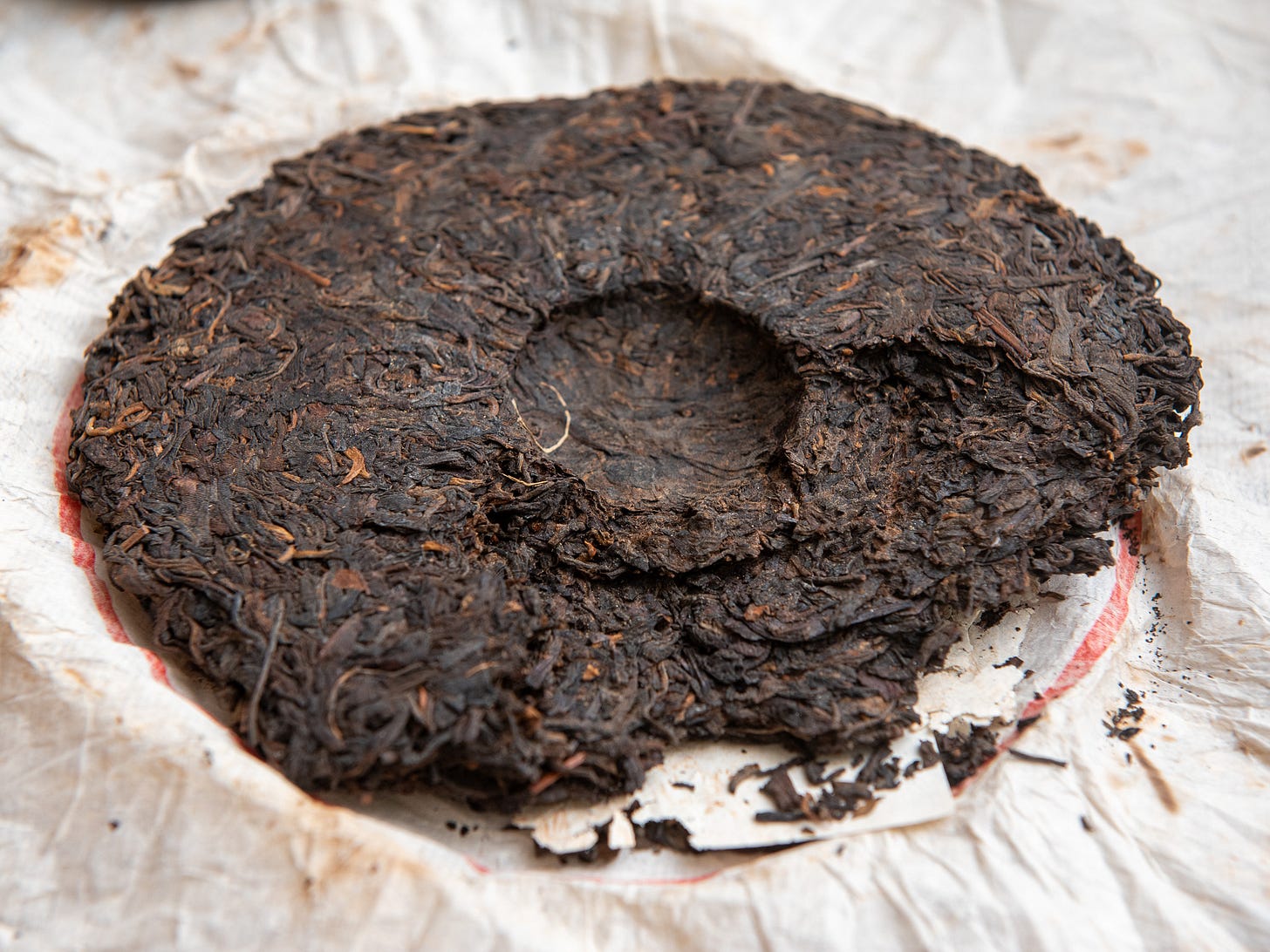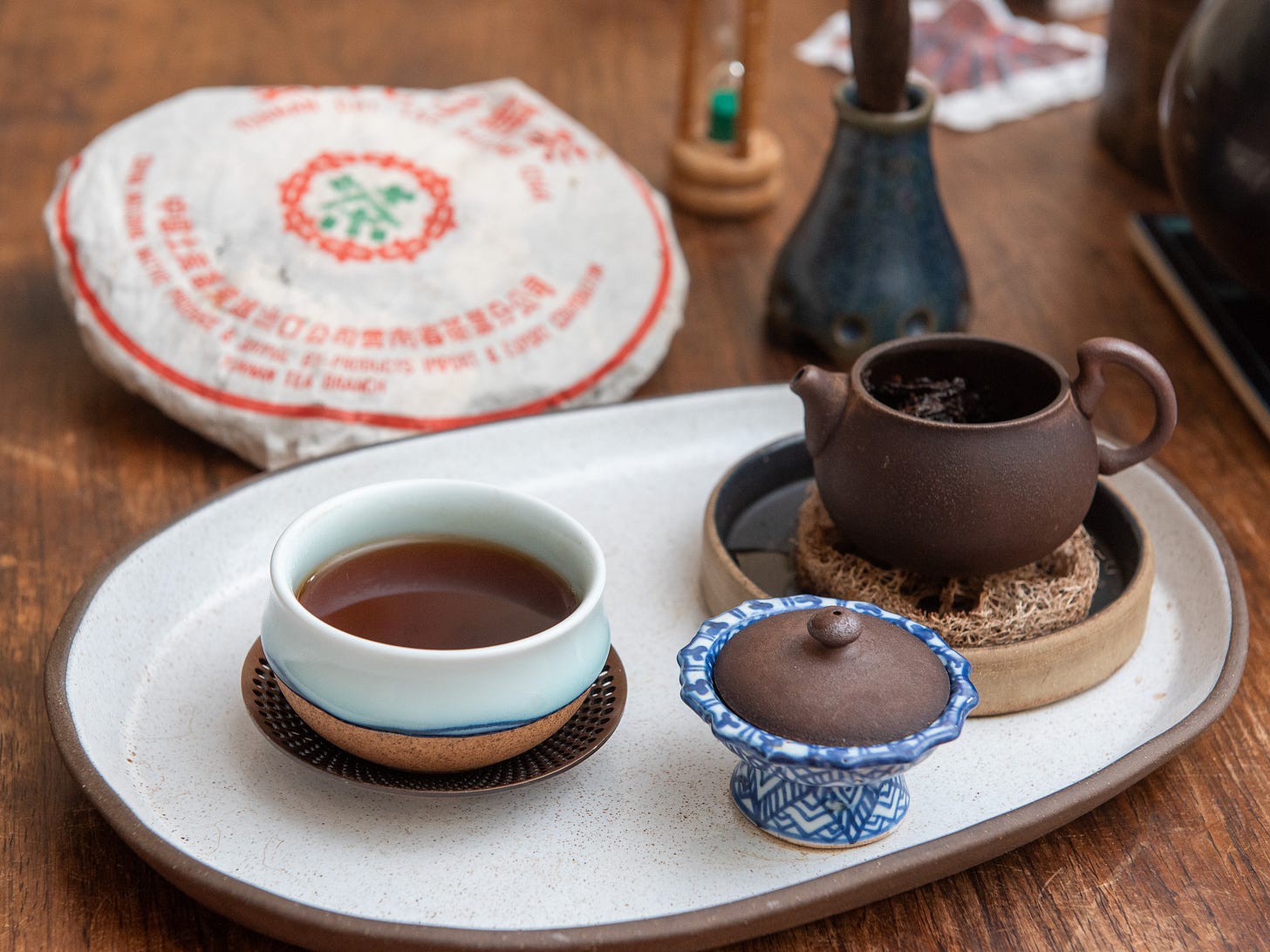Should I buy aged tea or age it myself?
A taste of old Hong Kong + how to shop for well aged teas.
What 20 years in a humid basement can do
The tea: 2004 commissioned 8582 raw puer, sold by Yee On Tea. $131 for 357g.
Here is a nice fermented tea for frayed nerves and rumbly tummies. Puer teas are often said to pack a punch, but when they’re subjected to traditional Hong Kong storage, they can turn mellow and rich with flavors of dates and ginseng. Two decades of skillful aging have made this tea viscous and syrupy. It glides down the throat and sits comfortably in the belly, unlike some teas that can leave you with gut rot. If you’re ailing from a heavy meal or stomach bug, this earthy, ginger-spice broth can soothe like nothing else.
The numbers “8582” refer to specific blend of leaf grades that are used to make tea in one of Yunnan’s largest factories. The brand Dayi, formerly the Menghai Tea Factory, has several famous house productions that are made to taste roughly the same from year to year. Johnnie Walker has the black label and blue label; Dayi has its 8582 and 7542. Many competing factories in Yunnan make their own versions of these renowned recipes, which are sometimes sold as their own thing, and sometimes disguised as the original article to fetch a more favorable price. The 8582 from 2004 demands a pretty penny in 2024. This 8582 is a much more affordable “dupe.” I enjoy it as a nice example of tea from the period and region. If you’re willing to wait until November, seller Yee On Tea usually runs a 20% off holiday sale that makes the tea even more attractive.
The source: Hong Kong has a long history of puer connoisseurship, and many shops in the city have been buying and aging tea from Yunnan for decades. Teas aged in Hong Kong are known to turn especially dark and earthy because of the city’s sultry climate. Specialist warehouses take this one step further with methods called traditional storage, in which the tea is subjected to controlled heat and humidity. In the same way that every cheese cave will age a cheese somewhat differently, Hong Kong warehouses have their own house tastes. That’s what you’re really paying for with this tea from Yee On, a shop that’s been cellaring puer since 1973. The storage has that telltale Hong Kong dank but it doesn’t obliterate the leaf. Shipping from Hong Kong is fast and reliable.
To brew: Steeping in a small pot or gaiwan will yield at least 12 smooth and sweet infusions, and you can chuck the spent leaves in a thermos to get more out of them. I use a heavy-ish dose (1g/14ml) and brew for 10 to 20 seconds, lengthening as I go. The tea has nice aromas of sandalwood and ginseng. Later, longer steeps develop a weighty texture I really enjoy, and I’m left with a sweet stony aftertaste and cool sensation on my tongue. Good tea can make you burp; the burps on this one feel great.
Aged tea: buy or DIY?
A well aged tea is like drinking time. When you brew it, you don’t just taste the qualities of the tea leaf and the skill in its processing. You experience its history: where and how it lived in the years between harvest and your cup. I’ve written about the pleasures of aged tea before, so I’ll refer you there for more on the why. Today I want to talk about the gritty details. Good aged tea is rare and usually expensive. How do you know what’s worth your money and time?
I’ve been aging tea for 15 years, and like most Western drinkers, I’ve been learning as I go. Aged tea culture in the United States is in its infancy. There’s no established best practice for aging tea like there is for wine. What people know, they’ve picked up from online chatter or their own experiences. Even in Asia, there are different schools of thought over how to age teas and which kinds benefit from the process at all. For new drinkers in search of authoritative answers, this can be frustrating, but what we lack in clear directions, we gain in opportunities for discovery. Every great tea tradition began with someone giving something strange a try. We don’t know what we don’t know yet, and that’s exciting.
Keep reading with a 7-day free trial
Subscribe to Leafhopper to keep reading this post and get 7 days of free access to the full post archives.







